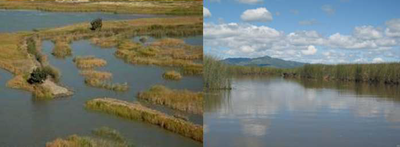June 10th, 2013

Sponsors of this seminar are: The Delta Science Program, The U.C. Davis Center for Aquatic Biology and Aquaculture (CABA) and the California Nevada Chapter of the American Fisheries Society
***Video of Seminar***
http://webcast.ucdavis.edu/llnd/73b1f03e
Convened by:
Peter Moyle, Professor in Wildlife, Fish and Conservation Biology ay U.C. Davis and
Matt Nobriga, Conservation Chair of the California Nevada Chapter of the American Fisheries Society.
ABSTRACT
The release of the draft Bay-Delta Conservation Plan (BDCP) adds urgency to the need to more fully understand how habitat in the Delta can be “restored” to benefit native fishes. Basically, the purpose of BDCP is to improve delivery of water to parts of the Bay Area, Central Valley and Southern California from the Sacramento River, while also improving conditions for endangered native fishes. A major assumption of current biological opinions and the BDCP is that restoration/construction of thousands of acres of tidal marsh habitat will have major benefits to fish, making up in part for the negative effects of altered flows and water diversions on these fish.
To address these issues, this seminar intends to explore the ecological linkages between tidal marshes and fish in the Delta (upper San Francisco Estuary). The speakers will focus on the following questions:
1. How are tidal marshes linked to estuarine productivity, especially of fish?
2. What are the historic and current linkages between tidal marshes and fish production in the Delta?
3. Do pelagic/open water fishes derive population-level benefits from tidal marshes? If so, is there a scale dependence - e.g., a ratio between marsh surface area and open water surface area/volume?
4. What are key remaining information gaps in systems both inside and outside California?
SPEAKERS
Ken Able, Professor, Institute of Marine and Coastal Sciences, Rutgers University
Don Baltz, Professor/Chair, Dept. of Oceanography & Coastal Sciences, Louisiana State University
Larry Brown, Research Biologist, USGS, California Water Science Center
Peter Goodwin, Lead Scientist, Delta Science Program
Robin Grossinger, Senior Scientist, San Francisco Estuary Institute
Bruce Herbold, Private Consultant (Estuarine Ecology)
Wim Kimmerer, Professor, SFSU, Romberg Tiburon Center
Peggy Lehman, Staff Environmental Scientist, CA Dept. of Water Resources
Si Simenstad, Research Professor, Wetland Ecosystem Team, University of Washington
Carl Wilcox, Bay Delta Regional Manager, CA Dept. of Fish and Wildlife
A G E N D A
8:30 a.m. Welcome and goals of symposium: Peter Moyle and Matt Nobriga
8:35 a.m. Introduction: Peter Goodwin: Why is this topic important?
8:45 a.m. Robin Grossinger: Tidal Wetlands in the Delta Past and Present: Extent, Character, and Transformation
9:15 a.m. Ken Able: East Coast Perspective: How Are Tidal Marshes Linked to Estuarine Productivity, Especially of Fish?
10:00 a.m. Don Baltz: Gulf Coast Perspective: How Are Tidal Marshes Linked to Estuarine Productivity, Especially of Fish?
10:45 a.m. MORNING BREAK
11:00 a.m. Larry Brown: Tidal Wetlands, Restoration, and Fish in the San Francisco Estuary: What Have We Learned in the Past 10 years?
11:30 a.m. Peggy Lehman: Material Flux and Carbon Production in Liberty Island Wetland
12:00 p.m. Si Simenstad: What Have We Learned from the BREACH Studies?
12:30 p.m. LUNCH BREAK
1:45 p.m. Wim Kimmerer: Where Does Pelagic Fish Food in the Delta Currently Come From?
2:15 p.m. Carl Wilcox: Bay Delta Conservation Plan (BDCP): Restoration Goals and Assumptions for Tidal Wetland Linkages to Fish Productivity
2:45 p.m. AFTERNOON BREAK
3:00 p.m. Research biologist panel: (moderator: Matt Nobriga)
Ken Able, Don Baltz, Peggy Lehman, Wim Kimmerer, Larry Brown, Si Simenstad
What Are the Prospects for Tidal Restoration Improving Conditions for Pelagic Organism Decline (POD) Species?
3:45 p.m. Open forum: Audience Q&A
4:15 p.m. Summary: Bruce Herbold
4:25 p.m. Wrap-up: Matt Nobriga and Peter Moyle
4:30 p.m. END
Seminar is free and open to the public.